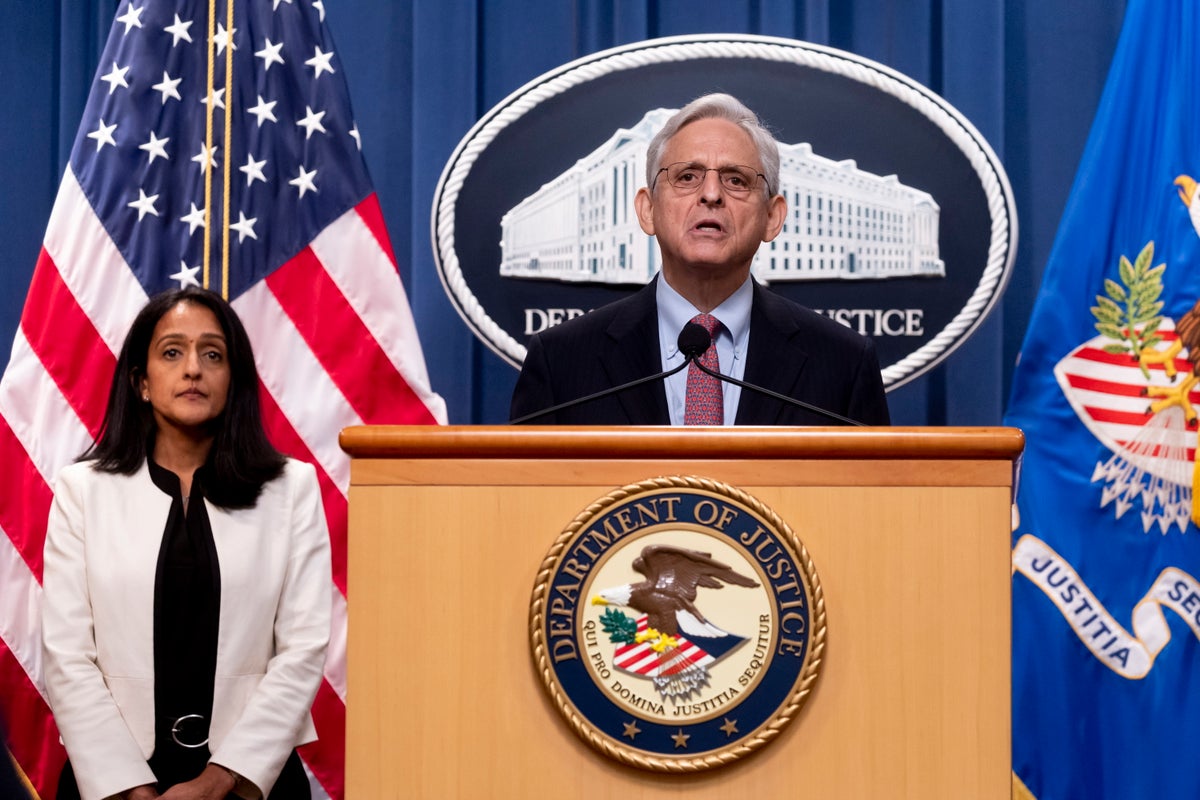
The US Department of Justice has sued the state of Idaho over its anti-abortion law that restricts access for patients who need lifesaving medical treatment, marking the first Biden administration lawsuit after the US Supreme Court’s decision striking down the constitutional right to abortion care.
Idaho’s law, which takes effect this month, outlaws abortion care in nearly all instances, including in emergency medical situtations, and providers could face arrest and prosecution if they perform an abortion to save the patient’s life, with the burden on doctors to prove they are not criminally liable if they do provide that care, according to US Attorney General Merrick Garland.
The Justice Department argues that Idaho’s measure violates the federal Emergency Medical Treatment and Labor Act that requires medical providers to offer emergency care.
“Any state law that prevents a hospital from fulfilling its obligation under [that law] violates federal law,” Mr Garland announced during a press conference on 2 August.
Associate Attorney General Vanita Gupta warned that Idaho’s law could “chill providers’ willingness to perform abortions” to save a pregnant patient’s life.
The lawsuit comes more than one month after the Supreme Court revoked the half-century precedent established in Roe v Wade, which affirmed a constitutional right to abortion, and handed decisions of legal abortion care to individual states.
Idaho is among several states that have moved to outlaw or severely restrict abortion access without protections under Roe. At least 10 states – Alabama, Arkansas, Kentucky, Louisiana, Mississippi, Missouri, Oklahoma, South Dakota, Texas and Wisconsin – have outlawed abortion entirely in nearly all instances, and more legal challenges are expected as more laws take effect. As many as 26 states could outlaw abortion without Roe, with states legislatures poised to draft more-restrictive laws in the coming weeks and months.
In the weeks following the Supreme Court ruling in Dobbs v Jackson Women’s Health Organization, “there have been widespread reports of delays or denials to pregnant women experiencing medical emergencies,” Mr Garland said.
“We will use every tool at our disposal to ensure that pregnant women get the medical care that they are entitled to.”
Idaho’s “trigger” law, which passed in 2020 and was designed to take effect once the Supreme Court overturned Roe, makes abortion care a felony up to five years in prison. The law makes exceptions if the procedure is to prevent the death of the patient or in cases of rape or incest.
The state was the first to approve an abortion ban mirroring a Texas law, though the state’s Supreme Court temporarily blocked the law following a legal challenge from Planned Parenthood. Both Idaho’s governor and the state’s attorney general have suggested that the ban is unconstitutional, though it remains in effect.
The state Supreme Court is scheduled to hear the case on 3 August.
President Joe Biden’s administration has told hospitals that they must provide emergency abortion care under the Emergency Medical Treatment and Labor Act, as patients who face a life- or health-threatening pregnancy complication may show up at an emergency room.
Complications can include “ectopic pregnancy, complications of pregnancy loss, or emergent hypertensive disorders, such as preeclampsia with severe features,” according to the US Department of Health and Human Services.
“If a physician believes that a pregnant patient presenting at an emergency department is experiencing an emergency medical condition as defined by [federal law], and that abortion is the stabilizing treatment necessary to resolve that condition, the physician must provide that treatment,” according to the agency’s guidance. “When a state law prohibits abortion and does not include an exception for the life of the pregnant person – or draws the exception more narrowly than [federal law’s] emergency medical condition definition – that state law is preempted.”
In a statement on Tuesday, Health Secretary Xavier Becerra said that “federal law is clear: patients have the right to stabilizing hospital emergency room care no matter where they live.”
“Women should not have to be near death to get care,” he added.
Last week, the Justice Department convened a White House meeting with legal experts and advocates to discuss legal representation in the wake of the Dobbs decision.
“It will take all of us – government lawyers, private pro bono attorneys, bar associations, public interest organizations – to do all we can to protect access to reproductive health care and to provide vigorous legal representation of patients, providers and third parties in need,” Ms Gupta said in a statement.







